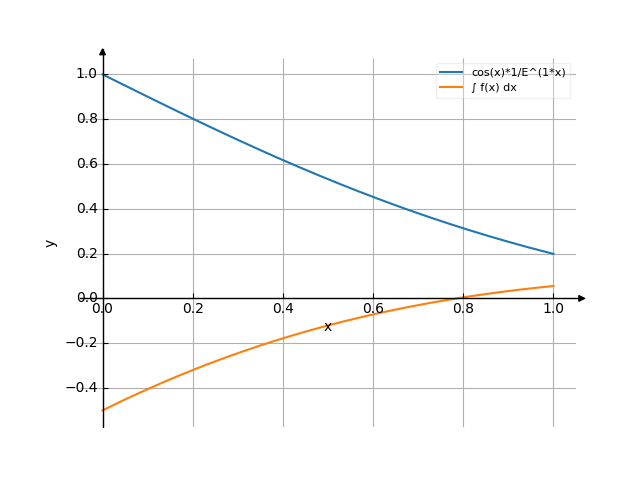Integral of e^(-x)*cos(x)*dx dx
The solution
You have entered
[src]
1 / | | -x | e *cos(x)*1 dx | / 0
$$\int\limits_{0}^{1} e^{- x} \cos{\left(x \right)} 1\, dx$$
Detail solution
-
Use integration by parts, noting that the integrand eventually repeats itself.
-
For the integrand :
Let and let .
Then .
-
For the integrand :
Let and let .
Then .
-
Notice that the integrand has repeated itself, so move it to one side:
Therefore,
-
-
Now simplify:
-
Add the constant of integration:
The answer is:
The answer (Indefinite)
[src]
/ | -x -x | -x e *sin(x) cos(x)*e | e *cos(x)*1 dx = C + ---------- - ---------- | 2 2 /
$${{e^ {- x }\,\left(\sin x-\cos x\right)}\over{2}}$$
The graph
The answer
[src]
-1 -1 1 e *sin(1) cos(1)*e - + ---------- - ---------- 2 2 2
$${{e^ {- 1 }\,\left(\sin 1-\cos 1\right)}\over{2}}+{{1}\over{2}}$$
=
=
-1 -1 1 e *sin(1) cos(1)*e - + ---------- - ---------- 2 2 2
$$- \frac{\cos{\left(1 \right)}}{2 e} + \frac{\sin{\left(1 \right)}}{2 e} + \frac{1}{2}$$
The graph

Use the examples entering the upper and lower limits of integration.

![Find the integral of y = f(x) = e^(-x)*cos(x)*dx (e to the power of (minus x) multiply by co sinus of e of (x) multiply by dx) - with detailed solution [THERE'S THE ANSWER!] e^(-x)*cos(x)*dx](/media/krcore-image-pods/176/hash/indefinite/b/c9/c4ed18b9c1d04af64bdc761d5ba22.png)
 Integral of e^(-x)*cos(x)*dx
Integral of e^(-x)*cos(x)*dx
 Integral of 2tanx
Integral of 2tanx
 Integral of cos(2pi(x))
Integral of cos(2pi(x))